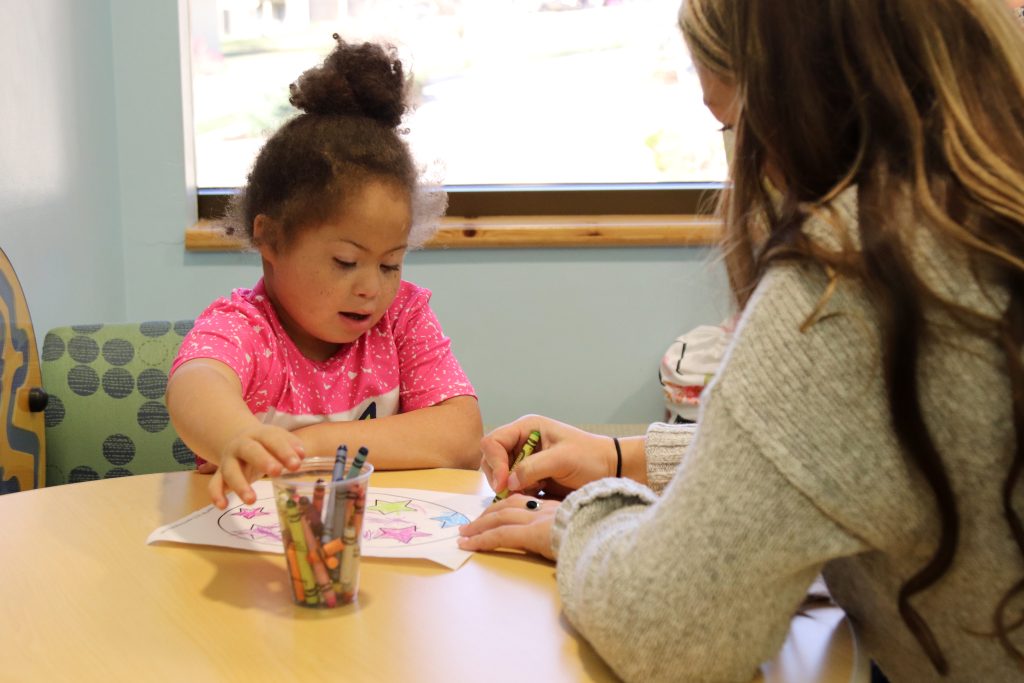Pediatric Neuropsychology
While many children with health problems may develop typically, certain factors such as prematurity, heart conditions, cerebral palsy, seizures, and brain injuries can impact central nervous system functioning, potentially putting a child at higher risk for developmental or intellectual concerns. At the Thompson Center, we recognize the importance of evaluating and monitoring cognitive functioning over time to maximize function and reduce stress.

About Pediatric Neuropsychology at the Thompson Center
Our comprehensive assessments are designed to detect and address developmental or cognitive challenges early on. By identifying potential concerns at an early stage, we can implement timely interventions and provide the necessary support to optimize the child’s developmental progress.
Our goal is to work closely with families, providing them with valuable insights and tailored recommendations to promote the best possible outcomes for their child’s cognitive development. By addressing these concerns proactively, we can empower children with health challenges to reach their full potential and thrive.
Benefits of Neuropsychological Evaluations
Neuropsychological evaluations play a crucial role in monitoring development, cognitive skills, mood, and behavior. Through these assessments, we identify strengths, challenges, and make targeted recommendations for schools, home environments, providers, and therapies. Our commitment to thorough evaluations ensures that children receive the tailored support needed to thrive in their neurodevelopmental journey.
What to Expect
The child will complete non-invasive tests with a technician that are similar to school tasks or thinking games. These tests are used to evaluate a variety of thinking skills, such as intelligence, development, academics, problem solving, language, attention, memory, learning, visual/spatial skills, motor skills, and mood/behavior. A neuropsychologist will interview the parent/caregiver about the child’s history and symptoms.
These evaluation appointments typically last up to four hours. Two weeks later, a neuropsychologist will meet with the family to review results, any diagnoses, and recommendations. A detailed report is provided with specific recommendations for optimal outcomes. In many cases, future evaluations are encouraged to monitor changes over time.
Neuropsychological Evaluations
The Thompson Center offers the following types of neuropsychological evaluations:
- Pediatric Neuropsychology Clinic: These evaluations are for patients aged 0-21 years with a current neurological condition that impacts the central nervous system. Common conditions seen include epilepsy, traumatic brain injury (TBI), cerebral palsy, extreme prematurity, various genetic syndromes, severe motor/hearing impairment, as well as conditions such as congenital heart defects, brain tumors/cancers, and neurofibromatosis.
- Concussion Neuropsychology Clinic: These time-sensitive evaluations assess patients ages 0-21 with a concussion that occurred within the last six months. Patients with moderate to severe concussions or concussions that occurred longer than six months prior are typically evaluated through our Pediatric Neuropsychology Clinic instead.
Insurance & Billing
These services are typically covered by most insurance programs, including Medicaid. Contact your insurance provider for detailed coverage information.
Getting Started
Fill out our online referral form or talk to child’s your pediatrician or neurologist to see if they are a good fit for our services.
